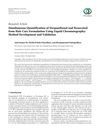 2 citations,
January 2017 in “PubMed”
2 citations,
January 2017 in “PubMed” Hair casts are harmless but can be mistaken for head lice.
 2 citations,
February 2016 in “African Journal of Traditional Complementary and Alternative Medicines”
2 citations,
February 2016 in “African Journal of Traditional Complementary and Alternative Medicines” Prolonged linseed ingestion is safe for rabbits.
 2 citations,
January 2016 in “Scientifica”
2 citations,
January 2016 in “Scientifica” Researchers created a reliable method to measure dexpanthenol and resorcinol in hair products.
 1 citations,
July 2023 in “International Journal of Biological Macromolecules”
1 citations,
July 2023 in “International Journal of Biological Macromolecules” The study created a new hair loss treatment paste that regrows hair faster and with fewer side effects than minoxidil alone.
 1 citations,
July 2023 in “Cureus”
1 citations,
July 2023 in “Cureus” Cetosomal minoxidil alone and with finasteride is effective and well-tolerated for hair loss treatment.
 1 citations,
January 2023 in “Metabolites”
1 citations,
January 2023 in “Metabolites” Changes in gut bacteria can contribute to the development of Polycystic Ovary Syndrome (PCOS), affecting metabolism, immunity, and causing inflammation. Treatments may involve adjusting these factors.
 1 citations,
January 2023 in “International Research Journal of Ayurveda & Yoga”
1 citations,
January 2023 in “International Research Journal of Ayurveda & Yoga” Ayurveda suggests natural treatments for premature hair greying caused by an imbalance of Pitta dosha.
 1 citations,
January 2022 in “Journal of Drug Delivery Science and Technology”
1 citations,
January 2022 in “Journal of Drug Delivery Science and Technology” A gel made with finasteride, garlic oil, and Aloe vera using nanotechnology can potentially treat hair loss more effectively.
1 citations,
January 2021 in “Menoufia Medical Journal” Alopecia areata may be linked to heart issues.
1 citations,
January 2021 in “Research journal of pharmacy and technology” 1 citations,
December 2019 in “Journal of skin and stem cell” PRP shows promise for short-term hair growth, especially in young men.
 1 citations,
December 2019 in “Current Medicinal Chemistry”
1 citations,
December 2019 in “Current Medicinal Chemistry” Anti-androgen drugs can help reduce OCD symptoms, but more large-scale trials are needed to confirm their effectiveness.
1 citations,
December 2019 in “Indian Journal of Pharmacy Practice”  1 citations,
November 2019 in “Archives of breast cancer”
1 citations,
November 2019 in “Archives of breast cancer” Some hormone treatments might raise breast cancer risk, while others don't seem to.
1 citations,
June 2018 in “Open Access Macedonian Journal of Medical Sciences” Recycling hair from past transplants can improve hair density and patient satisfaction.
 1 citations,
January 2018 in “PubMed”
1 citations,
January 2018 in “PubMed” Women with PCOS have a similar chance of getting pregnant using assisted reproductive treatment as those without PCOS.
 1 citations,
September 2017 in “Asian Journal of Pharmaceutical and Clinical Research”
1 citations,
September 2017 in “Asian Journal of Pharmaceutical and Clinical Research” Warfarin can rarely cause hair loss, which is usually reversible.
 1 citations,
April 2017 in “Journal of Investigative Dermatology”
1 citations,
April 2017 in “Journal of Investigative Dermatology” Higher minoxidil dose helps hair growth in non-responders without side effects.
 1 citations,
April 2015 in “Iranian Journal of Clinical Infectious Diseases”
1 citations,
April 2015 in “Iranian Journal of Clinical Infectious Diseases” H. pylori infection is not linked to PCOS or infertility.
 1 citations,
February 2013 in “African Journal of Pharmacy and Pharmacology”
1 citations,
February 2013 in “African Journal of Pharmacy and Pharmacology” Finasteride lowers good cholesterol, raises bad fats, and may increase heart disease risk.
 1 citations,
January 1996 in “Gynecological endocrinology”
1 citations,
January 1996 in “Gynecological endocrinology” Non-invasive imaging helped diagnose a woman's severe hormone imbalance and diabetes, and medication successfully treated her condition.
 February 2024 in “Pediatrics in review”
February 2024 in “Pediatrics in review” A 15-year-old girl with missed periods was diagnosed with a pituitary disorder and treated with hormones and steroids.
 July 2023 in “International journal of trichology”
July 2023 in “International journal of trichology” Injectable platelet-rich fibrin may stop hair loss from Discoid lupus erythematosus.
 January 2025 in “Journal of Personalized Medicine”
January 2025 in “Journal of Personalized Medicine” People with Alopecia Areata are more likely to have prediabetes and obesity.
December 2024 in “Archives of Dermatological Research”  November 2024 in “Journal of the European Academy of Dermatology and Venereology”
November 2024 in “Journal of the European Academy of Dermatology and Venereology” More effective treatments are needed for alopecia areata, hidradenitis suppurativa, and vitiligo.
 October 2024 in “Journal of the Endocrine Society”
October 2024 in “Journal of the Endocrine Society” Certain genetic variants reduce enzyme activity, contributing to non-classic congenital adrenal hyperplasia.
 October 2024 in “Journal of the Endocrine Society”
October 2024 in “Journal of the Endocrine Society” Certain genetic variants impair enzyme activity, contributing to non-classic congenital adrenal hyperplasia.
 September 2024 in “Journal of the American Academy of Dermatology”
September 2024 in “Journal of the American Academy of Dermatology” Hair loss significantly affects the quality of life for Muslim American women, especially those not wearing hijab.























